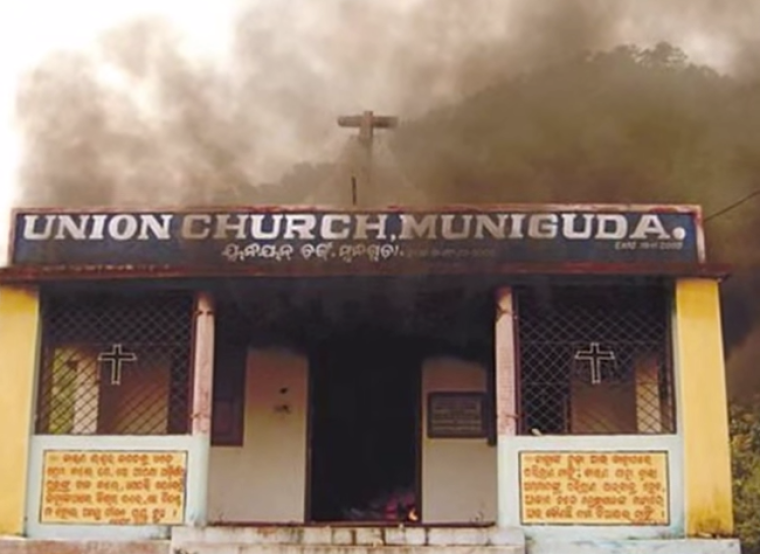Christians in India 7 years after Kandhamal riots persecuted under 'double' caste system

BHUBANESWAR, India (Christian Examiner) -- Seven years after rioting against Christians by Hindu extremists claimed the lives of 100 people and left thousands injured and displaced, Christians continue to experience persecution in the Kandhamal district of Odisha, an eastern state in India.
Violence against Christians came with a vengeance after the August 2008 killing of a highly revered Hindu monk and World Hindu Council leader, Laxshmanananda Saraswati, along with four of his aides, despite evidence that Maoists were behind Saraswati's murder.
Between August 25-28 of that year, Hindu militants, shouting tributes to Hindu gods, set fire to Christian settlements and killed at least 100 people and displaced an additional 50,000 refugees, some to makeshift camps and others to nearby forests where more died of hunger and snakebites. The rioting also destroyed at least 300 churches and 6,000 homes.
According to one Washington Post report, one possible factor for the rioting was the rapid conversion rate of impoverished tribal communities.
The region's Christian population had grown from six percent in 1971 to 27 percent by 2008. Rioters, at the time of the attack, wielding swords, hammers, and sticks were heard shouting, "India is for Hindus! Convert or leave!"
Although rioting on a massive scale has not occurred in India since the Kandhamal attacks, the Catholic news service Crux reports that persecution against Christians in the region continues.
Unconfirmed reports indicate that police recently killed two Christians near a border who climbed a hill to get a cell phone signal. The two were attempting to call their own children in another region of the country.
Catholic priest Ajaya Kumar Singh, head of the Odisha Forum for Social Action, said violence against Christians is common and India's caste system is partially to blame. Most Christians are considered lower-class "untouchables" while India's social elites are upper-caste Hindus.
"There's a double hatred," said Singh. "Because Christians are from the lowest caste, they're untouchable, and because they're Christians, they're seen as anti-national . . . they're treated worse than dogs."
There's a double hatred. Because Christians are from the lowest caste, they're untouchable, and because they're Christians, they're seen as anti-national . . . they're treated worse than dogs.
The 2008 violence, often inflamed by myths perpetuating falsehoods such as Christians forcing Hindus to eat beef in violation of the religion's belief in the sacredness of cattle, affected both Protestants and Catholics.
Rajesh Digal, a Pentecostal pastor who refused to recant his faith, was severely beaten and buried up to his neck in a pit for two days. He was given urine to drink before eventually being hacked to death with clubs and axes after his third refusal to deny his faith in Christ.
A Catholic nun, Sister Meena Lalita Barwa, was dragged into the streets where she was publicly disrobed and raped by a member of the mob. The same mob severely beat Reverend Thomas Chellen, a local priest, when he refused to rape Barwa. Chellen and Barwa both survived.
Local police rarely intervened in 2008 and 90 percent of cases filed against attackers never resulted in convictions. Today, most attackers are free men and frequently cross paths with the Christians who survived their torturous acts. Of the 100 people murdered during the four days of rioting, only 30 perpetrators were prosecuted and only two convicted.
Christian persecution continues
Meanwhile, in 2013, a Maoist leader and seven other people who the courts claim are Christians were convicted of Saraswati's murder. Among Christians in India, it is widely believed the seven are innocent.
In 2014, the Times of India reported that a trial, which began in 2010, saw three people convicted in the assault and rape of Barwa, with one man receiving 11 years of "rigorous imprisonment" and the others each receiving just over two years. The judge stated that his sentencing took into consideration that "the gang rape seems to have been committed on sudden impulse...." Six people were acquitted due to lack of evidence.
Local Christian activist Suranjan Nayak believes Christians still face danger. "The extremists are still holding underground meetings, and they still mutter threats when they pass people in the streets," Nayak said, admitting he no longer trusted his neighbor."It's always in my mind that he can do anything to me at any time."
In addition to caste system class prejudice, Singh sees other contributing factors to the ongoing persecution of Christians: nationalism which views all Christians as "Western;" economic leaders in need of cheap labor resisting Christian activists who inspire lower class citizens to assert their rights; political aspirations of Hindu-backed parties who believe distribution of anti-Christian propaganda delivers votes; media coverage which gives little room for Christians to have a voice of their own; and the silence of many Christian churches that do not use legal options to defend the rights of Christians.
Barwa hopes that the August anniversary of the riots will motivate Indian citizens to stand against religious violence. "Every person in this country should respect the religion of others and the humanity of others," she said.
Related Articles:
Christians punched & kicked by extremists in India
President Obama pushes for religious freedom in India
Church vandalized in India - fourth attack on Christians in 2 months